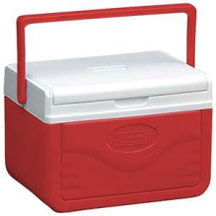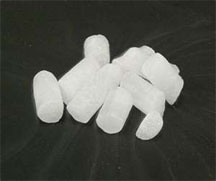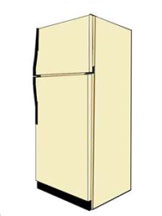7 Kitchen Solutions If Your Power Goes Out
By Patty Liston
 I don't know what is happening where you live, but already our mornings are cooler and the gold and burnt orange colors of fall are beginning to show on our mountains. As much as I would like to postpone winter, indefinitely, it will eventually come blowing in with skirts made of snow-flakes.
I don't know what is happening where you live, but already our mornings are cooler and the gold and burnt orange colors of fall are beginning to show on our mountains. As much as I would like to postpone winter, indefinitely, it will eventually come blowing in with skirts made of snow-flakes.
 1. Keep an appliance thermometer in the refrigerator and freezer. Should there be a power outage the thermometer will help you to determine how safe your food may be. The freezer should register at 0 degrees F (Fahrenheit) or below, and the refrigerator should be at 40 degrees F or below.
1. Keep an appliance thermometer in the refrigerator and freezer. Should there be a power outage the thermometer will help you to determine how safe your food may be. The freezer should register at 0 degrees F (Fahrenheit) or below, and the refrigerator should be at 40 degrees F or below.
 2. You may freeze containers of water for ice to help keep food cold in the freezer, refrigerator or coolers after the power goes out. Freeze refrigerated items such as leftovers, milk and fresh meat and poultry that you may not need to use immediately. This will keep them fresher, longer.
2. You may freeze containers of water for ice to help keep food cold in the freezer, refrigerator or coolers after the power goes out. Freeze refrigerated items such as leftovers, milk and fresh meat and poultry that you may not need to use immediately. This will keep them fresher, longer.
 3. Be sure to have several coolers on hand to keep refrigerator food cold should your power be out for more than 4 hours. The USDA suggests purchasing or making ice cubes and storing them in the freezer for use in the refrigerator or in a cooler, and freeze gel packs ahead of time for use in coolers.
3. Be sure to have several coolers on hand to keep refrigerator food cold should your power be out for more than 4 hours. The USDA suggests purchasing or making ice cubes and storing them in the freezer for use in the refrigerator or in a cooler, and freeze gel packs ahead of time for use in coolers.
 4. To help keep food cold longer, group food together in the freezer. Keeping block ice or dry ice in the refrigerator and freezer will help keep it as cold as possible if the power is going to be out for a while. The agency says fifty pounds of dry ice should hold an 18-cubic-foot full freezer for two days.
4. To help keep food cold longer, group food together in the freezer. Keeping block ice or dry ice in the refrigerator and freezer will help keep it as cold as possible if the power is going to be out for a while. The agency says fifty pounds of dry ice should hold an 18-cubic-foot full freezer for two days.
 5. Keep your refrigerator and freezer doors shut as much as possible to save energy and maintain the cold compartments. According to the USDA, food will be kept safely for four hours if the doors are left unopened. Your freezer, if full, will hold the temperature for around 48 hours, or 24 hours if it is half full and the door remains closed.
5. Keep your refrigerator and freezer doors shut as much as possible to save energy and maintain the cold compartments. According to the USDA, food will be kept safely for four hours if the doors are left unopened. Your freezer, if full, will hold the temperature for around 48 hours, or 24 hours if it is half full and the door remains closed.
 6. Throw away any perishable foods such as meat, poultry, fish, soft cheeses, milk, eggs, leftovers and deli items after 4 hours without power. Don't try tasting food to see if it is safe to eat. The last thing you will need is bacteria growing in your belly!
6. Throw away any perishable foods such as meat, poultry, fish, soft cheeses, milk, eggs, leftovers and deli items after 4 hours without power. Don't try tasting food to see if it is safe to eat. The last thing you will need is bacteria growing in your belly!
 7. Consider purchasing a small solar powered generator that will keep your refrigerator/freezer running in case of an emergency.
7. Consider purchasing a small solar powered generator that will keep your refrigerator/freezer running in case of an emergency.

